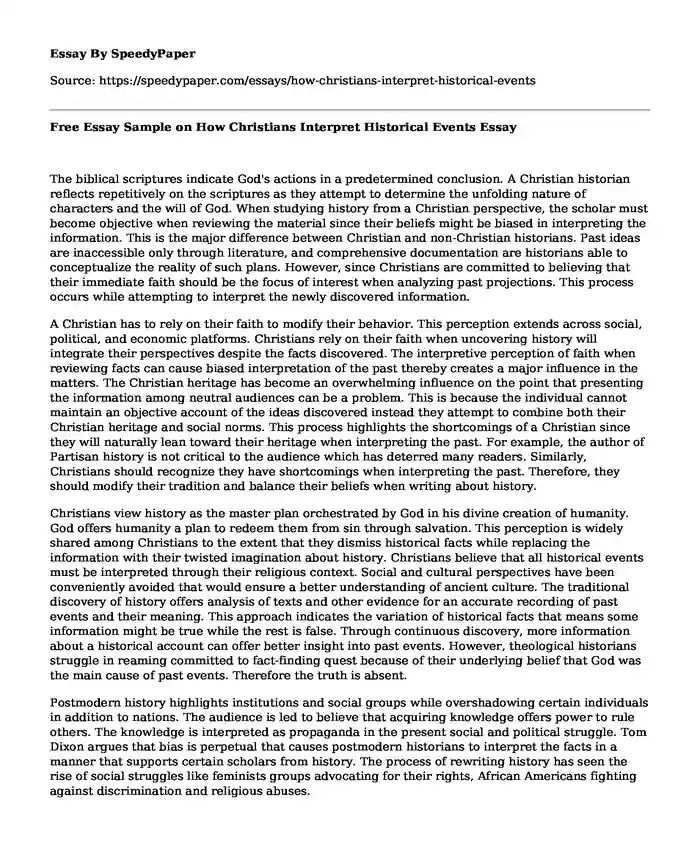
| Type of paper: | Essay |
| Categories: | History Christianity |
| Pages: | 3 |
| Wordcount: | 597 words |
The biblical scriptures indicate God's actions in a predetermined conclusion. A Christian historian reflects repetitively on the scriptures as they attempt to determine the unfolding nature of characters and the will of God. When studying history from a Christian perspective, the scholar must become objective when reviewing the material since their beliefs might be biased in interpreting the information. This is the major difference between Christian and non-Christian historians. Past ideas are inaccessible only through literature, and comprehensive documentation are historians able to conceptualize the reality of such plans. However, since Christians are committed to believing that their immediate faith should be the focus of interest when analyzing past projections. This process occurs while attempting to interpret the newly discovered information.
A Christian has to rely on their faith to modify their behavior. This perception extends across social, political, and economic platforms. Christians rely on their faith when uncovering history will integrate their perspectives despite the facts discovered. The interpretive perception of faith when reviewing facts can cause biased interpretation of the past thereby creates a major influence in the matters. The Christian heritage has become an overwhelming influence on the point that presenting the information among neutral audiences can be a problem. This is because the individual cannot maintain an objective account of the ideas discovered instead they attempt to combine both their Christian heritage and social norms. This process highlights the shortcomings of a Christian since they will naturally lean toward their heritage when interpreting the past. For example, the author of Partisan history is not critical to the audience which has deterred many readers. Similarly, Christians should recognize they have shortcomings when interpreting the past. Therefore, they should modify their tradition and balance their beliefs when writing about history.
Christians view history as the master plan orchestrated by God in his divine creation of humanity. God offers humanity a plan to redeem them from sin through salvation. This perception is widely shared among Christians to the extent that they dismiss historical facts while replacing the information with their twisted imagination about history. Christians believe that all historical events must be interpreted through their religious context. Social and cultural perspectives have been conveniently avoided that would ensure a better understanding of ancient culture. The traditional discovery of history offers analysis of texts and other evidence for an accurate recording of past events and their meaning. This approach indicates the variation of historical facts that means some information might be true while the rest is false. Through continuous discovery, more information about a historical account can offer better insight into past events. However, theological historians struggle in reaming committed to fact-finding quest because of their underlying belief that God was the main cause of past events. Therefore the truth is absent.
Postmodern history highlights institutions and social groups while overshadowing certain individuals in addition to nations. The audience is led to believe that acquiring knowledge offers power to rule others. The knowledge is interpreted as propaganda in the present social and political struggle. Tom Dixon argues that bias is perpetual that causes postmodern historians to interpret the facts in a manner that supports certain scholars from history. The process of rewriting history has seen the rise of social struggles like feminists groups advocating for their rights, African Americans fighting against discrimination and religious abuses.
Bibliography
Marsden, George. The State of Evangelical Christian Scholarship. EBook, 1st ed. Reprint, Atlas 1980.
Marsden, George. CHRISTIAN HISTORIANS and CIVIL RELIGION A Report. Journal, 1st ed. Reprint, Atlas 1974.
Marsden, George. The Spiritual Vision of History. Journal, 1st ed. Reprint, Atlas 1979.
Cite this page
Free Essay Sample on How Christians Interpret Historical Events. (2022, Jul 11). Retrieved from https://speedypaper.com/essays/how-christians-interpret-historical-events
Request Removal
If you are the original author of this essay and no longer wish to have it published on the SpeedyPaper website, please click below to request its removal:
- Essay Example on Abortion Experience
- Free Essay Providing the Analysis of a Cultural Group
- Research Paper Sample on Legionnaire's Disease
- Essay Sample on Group Dynamics and Intergroup Conflict
- Article Analysis Essay on 'Why Chinese Mothers Are Superior' by Amy Chua
- Free Paper - Outstanding Achievement Essay
- Paper Example: Spanish Versus British Colonization
Popular categories




